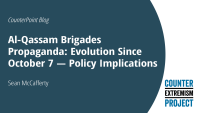Hamas

CEP Senior Director Dr. Hans-Jakob Schindler writes: "For far too long, European governments have comforted themselves with the assumption that Hamas terror attacks would remain confined towards targets in Israel and the Palestinian territories. The prevailing belief was that in Europe the group would concentrate on generating finances and building up political influence through catering towards its sympathisers.
European authorities were always clear about the general terrorist nature of Hamas. After all, the group’s Izz al-Din al-Qassem (IDQ) brigades was added to the EU Terrorist List in 2001, the year the list was created. The entire organisation was listed by the EU in 2003. The UK proscribed IDQ in 2001, but it took until 2021 for the British government to proscribe the entirety of Hamas. Nevertheless, the hope was that Europe may be spared from direct terror attacks by Hamas."

CEP Senior Director Dr. Hans-Jakob Schindler interviewed on Hamas networks in Germany and Europe: “At the beginning of October, three suspected Hamas terrorists were arrested in Berlin, accused by the Federal Prosecutor General of planning an attack. Now explosive details are coming to light: the warning apparently came from the Israeli secret service Mossad. German authorities then spent months tailing the suspects, observing them and tapping their phones. Finally, they were able to arrest several men and seize firearms. Possibly just in time, as our reconstruction shows.”

CEP Senior Director Dr. Hans-Jakob Schindler interviewed regarding Hamas fundraising. “Global News has learned of alleged Canadian links to the operations of the Palestinian terrorist group, Hamas. Among them, a Canadian is alleged to be part of the Hamas executive team and runs the group's investment office, which funds operations.”



Al-Qassam Brigades Propaganda: Evolution Since October 7 — Policy Implications
This is the third and final entry in a three-part blog series discussing the evolution of al-Qassam Brigades’ content, the group’s content-dissemination strategies, and the policy implications for combating terrorist content online.
CEP Senior Director Dr. Hans-Jakob Schindler interviewed. “US Vice President JD Vance is in Israel, meeting with Prime Minister Benjamin Netanyahu amid concerns over the Gaza ceasefire deal.”

The peace plan for Israel and Gaza calls for the disarmament of Hamas. That will be difficult to implement, says Hans-Jakob Schindler of the Counter Extremism Project: “Hamas has been maneuvering from the outset because it does not want to relinquish power in Gaza.”

CEP Senior Director Dr. Hans-Jakob Schindler interviewed about the clashes between Hamas and Israel and the current status of the deal.

Hans-Jakob Schindler from the Counter Extremism Project believes that disarming Hamas is currently a distant prospect. Speaking on ZDF's Morgenmagazin program, the terrorism expert said: “Hamas has repeatedly stated that it is prepared to relinquish administrative responsibility in the Gaza Strip – but not its weapons.”


The Counter Extremism Project Presents
Enduring Music: Compositions from the Holocaust
Marking International Holocaust Remembrance Day, the Counter Extremism Project's ARCHER at House 88 presents a landmark concert of music composed in ghettos and death camps, performed in defiance of resurgent antisemitism. Curated with world renowned composer, conductor, and musicologist Francesco Lotoro, the program restores classical, folk, and popular works, many written on scraps of paper or recalled from memory, to public consciousness. Featuring world and U.S. premieres from Lotoro's archive, this concert honors a repertoire that endured against unimaginable evil.